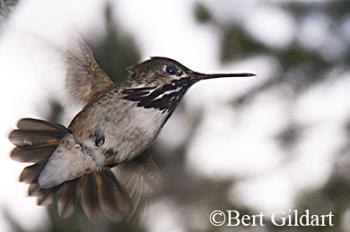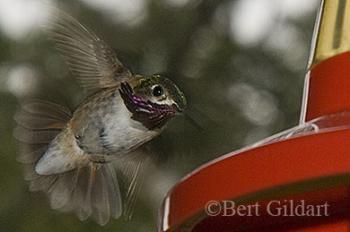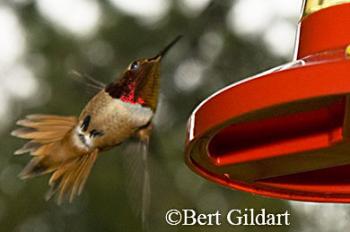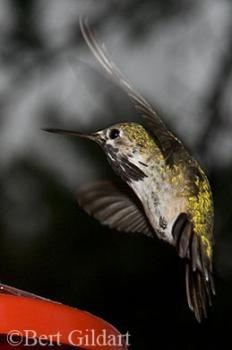Homecoming for Hummers–Hummingbirds that is
©Bert Gildart: Back home now in Montana and one of our first tasks was to refill bird feeders that have remained barren now for over four months. For us, that meant adding sugar water to the hummingbird feeder, suet to the cage-like container that attracts woodpeckers, and what appears to be several gallons of seed to the traditional feeder that in the past has attracted over a 30 different species of song birds.

Phenomenal wing beats
As we filled the feeders we questioned how long it would be before our first “guests” began to appear? We also wondered how they would know this source of food was once again available?

Feeders help with avian homecomings
The answer to the first question was: IMMEDIATELY! At least that was true at the hummingbird feeder. In fact, even before Janie climbed down from the short ladder several different species were buzzing around her head. Then, before the day was out a few of the song birds began to show. It was Homecoming time for us all.
AVIAN ESPERANTO
Just how these birds knew these feeders–empty for so long–were full once again was a mystery to me, though not to Sam Keen, who implied in his wonderful book entitled Sightings that we don’t give our feathered friends enough credit for intelligence. He says that birds in general may possess “…a smattering of a universal language, a kind of avian Esperanto, that gives them minimal access to the communications of other species.”
Four days later, and with our feeder now serving as an attractant for chickadees, finches, doves, and this morning, several crossbills, I’m inclined to believe him.
HUMMINGBIRD HEGIRA
The group, however, that has really grabbed our attention and that I want to focus on here are the hummingbirds–the ones I’ve devoted the past several days to photographing. Right now we have at least six different individuals battling one another for their turn at the feeder, specifically, the Rufous and the Calliope. Ornithologist say these two species typically nest in the Northwest, then migrate over 2000 miles to Mexico–or, as they are increasingly doing now–to some of our eastern states, such as Florida. Come spring, they turn around and return to the Northwest, clearly an epic journey, a Hegira!

Rufous Hummingbird
Though a quick search did not turn up any local banding studies, it would seem as though the hummingbirds that nested here last summer are among those that have returned this year to our backyard, else why did they seem to be waiting? If that’s the case, what skills enabled them to return to this precise location?
BIRD BRAINS
Once again I turn to Sam Keen: “A number of ornithologists,” writes Keen, “say birds have a kind of primitive Global Positioning System that matches the contours of the earth with a sort of map in their brains, an avian equivalent of Internet driving instructions.”
In this philosophical chapter on “Bird Brains,” Keen provides eloquent examples that birds posses their own type of intelligence that parallels the intelligence of mammals. He quotes several professors who say birds have neurological clusters that are functionally equivalent to the mammalian neocortex.

Ephemeral gold of Calliope Hummingbird
His explanation satisfies me and so I believe that I am seeing some of the same birds that graced our deck about this time last year. Now they’re back; they’re home! And once again, they’re providing us with an immense amount of pleasure-and once again forcing us to dig out our books on bird behavior and turn to those pages that inform on hummingbirds. In so doing we’re reminded that hummingbirds in captivity may live as long as 17 years, meaning that these birds may truly be some of our old friends. And now our hummingbirds are home.
HIGHEST METABOLISM
We’re also reminded that these tiny dynamos now flitting around our feeder have the highest metabolism of all animals. Put in other words, it means that to support the energy output of wings rotating 70 times a second, hearts must elevate–and they do so registering up to 1,260 beats per minute. Typically, when human hearts are under exertion they register at 140 to 160 beats per minute.
Of course all this requires food and they must consume more than their own weight in nectar each day. To do so they need access to hundreds of flowers each day–or to an admirer’s bird feeder.
Night, however, creates a different scenario; then they conserve energy by entering a hibernation-like state known as torpor at which time heart rates drop to 50-180 beats per minute, depending on the species.
With that refresher on hummingbirds, I felt I was almost up to snuff on avian biology. All that remained was some confirmation of a species I see all too little. To help, I called on Bob Muth, a teacher friend who has distinguished himself with awards in his field and who also has a passion for aves.
Why, I asked Bob, the gold streak on the back of this bird. Is it really a Calliope Hummingbird?
ROBERT FROST POEM
Bob confirmed my I.D., adding that the wonderful gold was probably just light refraction from my strobes. Then he added a Robert Frost poem that not only defined the photographic moment, but also the tenure of the species at our feeder, for we know that all too soon, they’ll be gone, chicks hatched and raised–and then off. But we’ll enjoy the moment, relishing all the pleasure our feeders provide, particularly now when we’re all coming home.
Nature’s first green is gold,
Her hardest hue to hold.
Her early leaf’s a flower;
But only so an hour.
Then leaf subsides to leaf.
So Eden sank to grief,
So dawn goes down to day.
Nothing gold can stay.
Note: Here are some other posts I’ve made on the pleasure derived from bird feeders:

